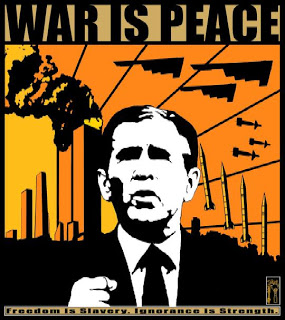“Diplomacy” As The Art Of Cultivating Conflict
 The purpose of diplomacy is to protect our independence and security through means other than war.
The purpose of diplomacy is to protect our independence and security through means other than war.
Those occupying the upper echelons of the Bush Regime define diplomacy as the practice of removing impediments to war. Indeed, for Dick Cheney and his cohorts, manufacturing pretexts for war is the highest form of diplomacy.
But then again, as Stephen Kinzer documents extensively in his fascinating (and infuriating) book Overthrow: America’s Century of Regime Change from Hawaii to Iraq, that type of perverse “diplomacy” has long been the Power Elite’s stock-in-trade.
Of John Foster Dulles, scion of a family deeply rooted in the Anglo-American Elite, one biographer noted that “it was not too difficult … for threats and interests to merge in [his] mind,” leading him to the conclusion “that the United States might actually have an interest in being threatened, if through that process Americans could be goaded into doing what was necessary to preserve their way of life.” Thus Dulles and his brother, CIA Director Allen Dulles, arranged the 1953 Iranian coup that deposed Mohammad Mossadegh, thereby creating the conditions for several decades of stimulating conflict in the Persian Gulf that may well culminate in an apocalyptic war.
I hasten to clarify that the “way of life” referred to above is one in which the bulk of the American population dutifully submits to the benevolent supervision of the likes of Dulles – the anointed Guardians of the Bipartisan Consensus. Keeping the population perpetually alarmed over some foreign threat is a vital part of maintaining that sinister stability; absent such a perpetual crisis, at least some of the people would start agitating for a smaller, less expensive, and less invasive government.
So threat cultivation is necessary in order to ensure a rich harvest of government power. This is hardly a secret; it’s been the common practice of rulers for as long as they have afflicted humanity. But the Bush Regime has distinguished itself somewhat by its vulgar, transparent lust for war, and its dogmatic refusal to explore alternatives. It’s not their wealth that’s being wasted, or their own flesh and blood being rent, by the needless wars they pursue.
To get some sense of just how alienated the Regime is from reality as the rest of us experience it, consider this: The administration’s eagerness to go to war with Iran has alarmed Fareed Zakaria.
A little more than a decade ago, Mr. Zakaria – at the time managing editor of the Council on Foreign Relations journal Foreign Affairs – kicked off his career as foreign affairs columnist for Newsweek with an essay entitled “Thank Goodness for a Villain.” The piece contained this breathtaking specimen of Establishment “wisdom”:
“If Saddam Hussein did not exist, we would have to invent him. He is the linchpin of American policy in the Mideast…. If not for Saddam, would the Saudi royal family, terrified of being seen as an American protectorate (which in a sense it s), allow American troops on their soil? Would Kuwait house more than 30,000 pieces of American combat hardware, kept in readiness should the need arise? Would the king of Jordan, the political weather vane of the region, allow the Marines to conduct exercises within his borders?… The end of Saddam Hussein would be the end of the anti-Saddam coalition. Nothing destroys an alliance like the disappearance of the enemy.”
Of course, the Power Elite Zakaria spoke for did indeed create Saddam, for precisely the purposes Zakaria describes. As I’ve said before, rational people understand that sometimes it is necessary to create alliances to confront enemies; the depraved, power-intoxicated people Zakaria communes with prefer to create enemies in order to justify entangling alliances.
However, at some point Zakaria seems to have retrieved his conscience, or at least recovered his sense of the absurd. With the administration and its supposed Democratic antagonists lusting for war with Iran, and the Regime’s media minions depicting Iran as a world-historic menace, Zakaria has taken up the unfamiliar role of dissident.
“Iran has an economy the size of Finland and an annual defense budget of around $4.8 billion,” he wrote in a recent Newsweek contribution. “It has not invaded a country since the late 18th century. The United States has a GDP that is 68 times larger and defense expenditures that are 110 times greater. Israel and every Arab country (except Syria and Iraq) are quietly or actively allied against Iran. And yet we are to believe that Tehran is about to overturn the international system and replace it with an Islamo-fascist order? What planet are we on?”
“We’re on a path to irreversible confrontation with a country we know almost nothing about. The United States government has had no diplomats in Iran for almost 30 years. American officials have barely met with any senior Iranian politicians or officials. We have no contact with the country’s vibrant civil society. Iran is a black hole to us – just as Iraq had become in 2003.”
Zakaria cites the account of James Dobbins, who served as Bush’s representative to the international donor’s conference in Bonn following the eviction of the Taliban. Dobbins recalls that the Iranians “were very professional, straightforward, reliable and helpful.” After dipping their toes in the mysterious waters of Washington-centered diplomacy, the Iranians wanted to take the full plunge, offering additional cooperation in Afghanistan and wide-ranging talks with the US on a variety of issues.
“Dobbins took the proposal to a principals meeting in Washington only to have it met with dead silence,” recounts Zakaria. “The then Secretary of Defense Donald Rumsfeld, he says, `looked down and rustled his papers.’ No reply was every sent back to the Iranians. Why bother? They’re mad.”
The current issue of Esquire offers a similar account of Bu’ushist “diplomacy” toward Iran.
In April 2003, State Department official Hillary Mann received a detailed four-page fax from the Iranian government. The document, which was sent through the Swiss embassy in Tehran (through which Iran and the US have maintained back-channel contacts) contained “a detailed proposal for peace in the Middle East, approved at the highest levels in Tehran.”
The Iranians offered to recognize Israel, cut off all support for the terrorist groups Hamas and Islamic Jihad, banish or imprison all international terrorists residing in Iran, and to end its nuclear program. The message urged Washington to re-open formal diplomatic channels that have been closed for decades.
The Bush administration refused even to acknowledge the overture from Tehran. Former National Security Council official Flint Leverett (who resigned in digust following the needless invasion of Iraq) protested that the rejection would mean “an Iran that has nuclear weapons and no dialogue with the United States.”
Odd as this result might seem to those familiar with conventional diplomacy, it makes perfect sense once it’s understood, once again, that the purpose of Bush/Cheney-style diplomacy is to facilitate, rather than mitigate, conflict.
As the estimable Charley Reese observes with characteristic concision, “The reason our so-called diplomacy hasn’t worked [as most people would understand the term `worked’] is because the Bush administration position is this: Iran, unless you stop what you are legally entitled to do (enrich uranium for nuclear fuel), we won’t talk to you about not doing what you are legally entitled to do. You can’t have talks if your position is that the other side must give in to your demands as a precondition.”
But once again, talking with the Iranians is exactly what the Bush Regime wants to avoid. Direct talks with the Iranians, after all, might lead to a solution other than the war Washington craves — and what responsible leader would run such a risk?
Content retrieved from: http://freedominourtime.blogspot.com/2007/10/diplomacy-as-art-of-cultivating.html.




